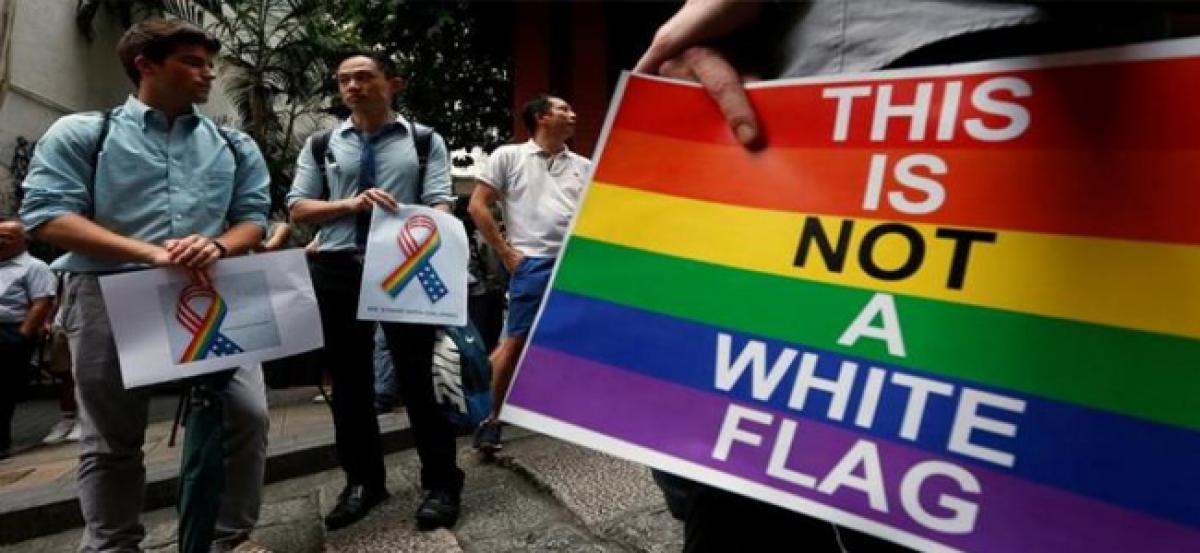Live
- Starc, Hazlewood, Cummins added to BBL 14 supplementary lists
- Flood risk in low-lying areas of Chennai as Chembarambakkam Lake’s water level rises
- Pushpa 2 Theatre Canteen Owner Bites Customer’s Ear in Gwalior
- RG Kar tragedy: Statement of forensic doctor who took pictures of victim’s body crucial for CBI
- Include Valmiki community in ST list, MP Ambica pleads
- Nara Lokesh Urges Rapid Investment Approvals to Boost Employment in MSME Sector
- Chandrababu Advocates Strict Measures for Social Welfare and Infrastructure Development in AP
- Show of brotherhood by Vijayan, Stalin at event to honour Dravidian icon
- District Collectors’ conference with CM begins
- Celebrations kick off in Saudi Arabia to welcome FIFA World Cup 2034
Just In

Taiwan\'s decision giving same-sex couples the right to marry has proved a shot in the arm for the gay rights movement in Asia, but it is likely to be many years before China approves similar measures, amid deep-rooted opposition in some quarters.
BEIJING: Taiwan's decision giving same-sex couples the right to marry has proved a shot in the arm for the gay rights movement in Asia, but it is likely to be many years before China approves similar measures, amid deep-rooted opposition in some quarters.
Until 2001, China listed homosexuality as a mental disorder, but it is not illegal to be gay. Many large cities have thriving gay scenes, although gay men and women still face a lot of family pressure to get married and have children.
Wednesday's decision, the first such ruling in Asia, cements Taiwan's position as a beacon of liberalism in the region, and could prompt legal action by activists in Thailand, home to one of Southeast Asia's most vibrant lesbian, gay, bisexual and transgender communities.
Mainstream Chinese media either ignored the decision by Taiwan's constitutional court, or focused on the island's few protesters against it. The decision had "caused controversy", the state-run Xinhua news agency said.
China sees Taiwan as a wayward province to be brought under Beijing's control by force if necessary, and considers its people to be Chinese citizens. Proudly democratic Taiwan has shown no interest in being ruled by China.
But it is only a matter of time before China approves same-sex marriage, the English version of the Global Times, published by the official People's Daily, said.
"The ruling proves that same-sex marriage is acceptable in Chinese culture, and is likely for the Chinese mainland to legalise gay marriage within a decade," Li Yinhe, a prominent sexologist at the Chinese Academy of Social Sciences who has backed proposals to legalise gay marriage, told the paper.
But the far more widely read Chinese version of the paper was silent on how the decision might affect China.
Despite muted government reaction, the news drew millions of views and many broadly supportive comments on Weibo, China's answer to Twitter.
"This is the broad trend of the times. It doesn't hurt anybody else," Li Tingting, a gender equality and gay rights activist, told Reuters.
Taiwan's decision would help promote the same-sex marriage issue in China, said Li, who was detained in 2015 for trying to fight sexual harassment and goes by the pseudonym Li Maizi.
"But the problem is society is too conservative," she added. "Many people have never had any contact with anyone gay."
As if underscoring that view, a Chinese academic denounced the news on the site Confucian Web, urging parents in Taiwan to move to China to safeguard children from catching AIDS.
Wei Xiaogang, who works on gay rights and gender issues at the Beijing Gender Health Education Institute, said he felt reaction in China had been generally positive.
"It raises the visibility of equal marriage in China, and if more places in Asia approve this, China will feel like it won't want to be left behind," Wei told Reuters, though he could not predict how long the change might take.
CHANGING ATTITUDES
Chinese literature and history are rich in description of relatively liberal attitudes to homosexuality in imperial times, but the Communist revolution of 1949 ushered in more prudish attitudes towards sex.
Beginning in the late 1970s, however, China eased up on such strictures as it embarked upon landmark economic reforms.
Still, though there are a handful of openly gay celebrities, no Chinese politicians will acknowledge being gay in public, unlike in Western countries.
Trying to gauge the extent of support for gay rights in China is difficult as no proper polls are published, said Sun Wenlin, whose landmark case last year seeking permission to marry his boyfriend was rejected by a Chinese court.
Past suggestions by a handful of representatives in China's largely rubber stamp parliament for gay marriage to be legalised have now fallen by the wayside, said Sun.
"There's no platform for dialogue about this in China at the moment," said Sun, adding that he was looking into ways to get married in Taiwan once the decision became law there.
"I think about half the people I speak to support gay marriage and half oppose," he said. "Generally younger people support it, and those who don't can't really explain why."
Sun will speak next month on the subject at the Shanghai Pride festival, which began in 2009 and bills itself as the longest-existing event of its kind in China.
The Taiwan ruling's influence extends across Asia, though.
In Thailand, activists said it would provoke redoubled effort to get the military-ruled country to legalise gay marriage.
"I believe long-term gay couples will soon make a similar petition to the administrative court to amend the law," said Danai Dinjongrak, director of the Rainbow Sky Association of Thailand.
"Activists are already calling each other on the phone, talking about rallying people for the petition."

© 2024 Hyderabad Media House Limited/The Hans India. All rights reserved. Powered by hocalwire.com







